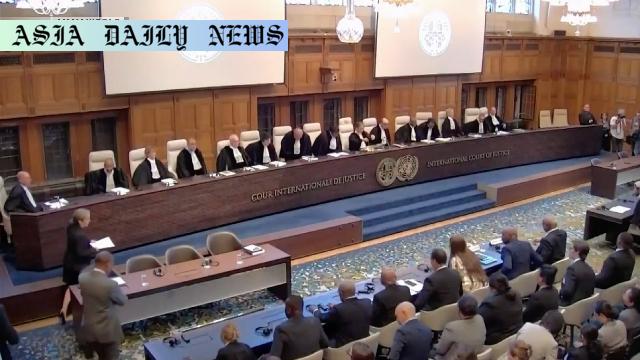Climate Change – ICJ mandates obligations under international law for countries to address climate change and curb greenhouse gas emissions.
- The ICJ declared countries must take steps to address climate change under international law.
- The ICJ’s advisory opinion emphasized the need for global cooperation across different fields of expertise.
- It stresses that combating climate change is vital for the enjoyment of human rights.

ICJ Declares Climate Change a Global Legal Obligation
The International Court of Justice (ICJ) has issued a landmark advisory opinion addressing the obligations of countries under international law regarding climate change. Delivered in The Hague, this opinion underscores the severe consequences of climate change and identifies the steps countries must take to mitigate its impact. ICJ President Iwasawa Yuji emphasized the urgency of the situation, describing climate change as an existential threat that necessitates prompt, decisive action.
The ICJ’s advisory opinion, while non-binding, carries significant moral authority. It stresses the necessity for countries to not only reduce greenhouse gas emissions but also to actively protect the environment. These protective measures are deemed essential for upholding fundamental human rights, as climate change increasingly impinges on individuals’ rights to safety, health, and livelihood. As the effects of a warming planet become more apparent, addressing this crisis has become a shared responsibility that transcends national borders and political divides.
Global Cooperation: A Multidisciplinary Approach
One of the key takeaways from the ICJ’s statement is the need for contributions from all fields of human knowledge. This highlights the multidisciplinary nature of the fight against climate change. Addressing rising temperatures and environmental degradation isn’t just a scientific or policymaking challenge—it requires innovation from experts in technology, economics, sociology, and other disciplines. An integrated approach that bridges these areas will better equip humanity to tackle the challenges of climate change.
The ICJ opinion expresses hope that its findings will inform social and political action globally. It reinforces the idea that international collaboration is crucial—not just an option—for mitigating the profound, far-reaching effects of environmental damage. This is particularly critical as extreme weather events, displacements, and resource insecurities increasingly threaten vulnerable populations worldwide.
Environmental Protection and Human Rights
A unique perspective presented by the ICJ ties environmental preservation directly to the enjoyment of human rights. Climate change disproportionately affects marginalized populations who often have the least capacity to adapt or respond. Thus, protecting the environment is no longer simply an ecological task but an imperative for safeguarding basic human dignity.
This conclusion by the ICJ offers a broader context in which climate action is examined, moving it beyond the realm of treaty-based commitments to one of fundamental rights and responsibilities. The opinion could serve as the legal and ethical foundation for future global policies, fostering a narrative of justice for those most affected by climate crises.
The Challenge Ahead
Although the ICJ’s advisory opinion is non-binding, it carries significant implications. Individual nations must review their climate policies in light of the court’s findings. It is a call to action, urging nations to transcend mere rhetoric and implement policies that result in measurable environmental improvements. Countries that delay action risk escalating the already severe repercussions of climate change, which include rising sea levels, erratic weather patterns, and biodiversity loss.
Global cooperation and interdisciplinary problem-solving are the need of the hour. Achieving this requires not only governmental commitment but also buy-in from the private sector, academia, and civil society. The ICJ’s opinion serves as a powerful reminder of what is at stake and should inspire collective efforts to combat climate change effectively.



Commentary
Reflections on the Role of ICJ in Climate Action
The recent advisory opinion by the International Court of Justice on climate change obligations is a reminder of the global dimensions of this critical issue. It reaffirms that addressing climate change is not merely an environmental or political concern but a legal and ethical obligation for all nations. The ICJ’s declaration highlights the importance of international cooperation and raises awareness about the far-reaching implications of climate inaction.
A Multidisciplinary Solution for a Complex Problem
What stands out most in the ICJ’s statement is its acknowledgment of the need for input from diverse fields. Tackling climate change isn’t a challenge that any one sector can solve alone. This advisory opinion serves as a wake-up call for scientists, policymakers, economists, and civil society organizations to pool their expertise and innovate solutions. The emphasis on an integrated approach is crucial, considering the complex interplay of factors that contribute to climate change.
The Connection Between Climate and Human Rights
The ICJ’s focus on the link between environmental preservation and human rights adds a new dimension to the climate discourse. Marginalized communities are disproportionately affected by climate change, and framing this as an issue of rights ensures these groups are not overlooked. The court’s stance reinforces the need for policies that not only address climate change but also prioritize inclusivity and equity.
Moving Forward with Urgency
The ICJ has set the stage for transformative action. However, the onus lies on individual countries to translate these recommendations into robust policies. This moment presents an opportunity for global leaders to act decisively, recognizing the shared responsibility to protect our planet. The advisory opinion, while non-binding, could serve as a milestone in legal and social advocacy for addressing climate change comprehensively.